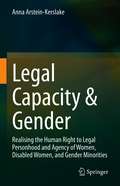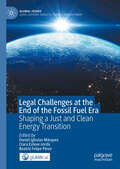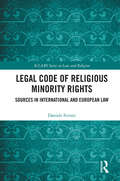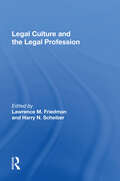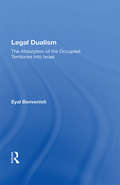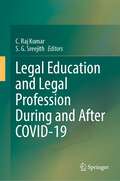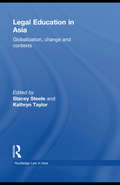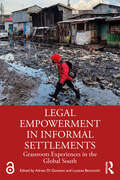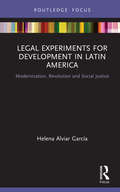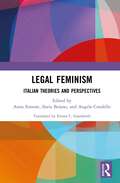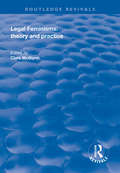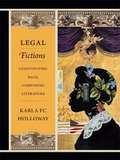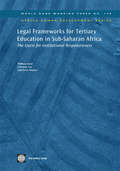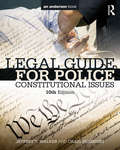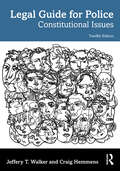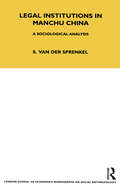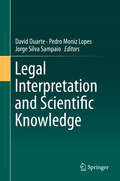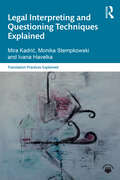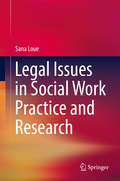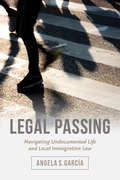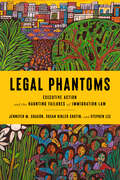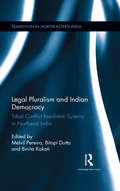- Table View
- List View
Legal Capacity & Gender: Realising the Human Right to Legal Personhood and Agency of Women, Disabled Women, and Gender Minorities
by Anna Arstein-KerslakeThis book is one of the first to explore legal capacity denial in relation to women, disabled women, and gender minorities. It discusses in depth the meaning of the right to legal capacity and its two core elements – legal personhood and legal agency. Using critical feminist, disability, and queer theory, it offers insights into the construction of legal personhood and its role as a predictor of power and privilege. The book also identifies patterns of oppression through legal capacity denial in various jurisdictions and discusses cases in which modern law continues to enforce these denials. Legal capacity is essential for an individual’s participation in society. It is required for voting, marrying, inheriting, contracting, consenting and other areas that are critical components of social structures and can be predictors of power and privilege. Historically, women have been denied legal capacity in many ways. For example, they have been denied legal capacity to vote, inherit, and contract – and some of these practices continue today. The legal capacity of disabled women is frequently denied through laws that deny decision-making on the basis of disability, such as guardianship, mental health laws and capacity to consent laws. In turn, the legal capacity of gender minorities is also denied in numerous ways – for example, in situations where government-issued identification, such as a passport, is required for the exercise of legal capacity but requires gender-binary identification. In these situations, it may be impossible or very dangerous for some gender minorities to acquire or use such identification – resulting in an inability to exercise their legal capacity. In these ways and many others, the intersection of disability and gender can result in multiple forms of marginalisation through legal capacity denial.The right to legal capacity has been protected in international human rights law since the 1960s. It is derived from the right to equal recognition before the law, which can be found in the 1966 International Covenant on Civil and Political Rights (ICCPR). It was reiterated in more detail in the 1979 Convention on the Elimination of Discrimination Against Women (CEDAW) and finally enumerated extensively in the 2006 Convention on the Rights of Persons with Disabilities (CRPD). Article 12 of the CRPD explicitly guarantees the right to legal capacity and establishes a state obligation to provide support for the exercise of legal capacity. This book argues that the right to legal capacity is a non-derogable civil and political right. It presents both a legal argument to support this, as well as a normative analysis of the importance of the right to legal capacity in maintaining equality in socio-legal systems. In addition, the book presents solutions: it identifies practices to learn from in various jurisdictions around the world – including both civil law and common law jurisdictions. It also uses case studies to illustrate the ways in which existing laws, policies and practices could be reformed. As such, the book offers both a novel contribution to the field of legal capacity law and a tool for creating change and helping to realise the right to legal capacity for all.
Legal Challenges at the End of the Fossil Fuel Era: Shaping a Just and Clean Energy Transition (Global Issues)
by Daniel Iglesias Márquez Clara Esteve-Jordà Beatriz Felipe PérezThis edited collection proposes a wide range of approaches to address the legal issues pertaining to the end of the fossil fuel era. While the fossil fuel era is coming to an end both because of the inherent limits of its resources and because of the need to prevent to further pump out CO2 in an already saturated atmosphere, the legal dispositions to ensure an ordered and rational shift toward cleaner energy still need to be developed. Not only in relation to CO2 emissions themselves but also in relation to the manifold issues related to environmental justice in an era of global climate change and global warming. This book is unique in that it provides a theoretical framework but also works to address cutting edge issues through a series of case studies.
Legal Code of Religious Minority Rights: Sources in International and European Law (ICLARS Series on Law and Religion)
by Daniele FerrariThis volume presents a systematic collection of the various international legal sources that define the rights of religious minorities.In a time of increasing tensions around religious minorities, this volume presents a systematic collection of international and European documents on the protection and promotion of religious minorities’ rights. The code includes documents from the United Nations, the Council of Europe, the Organization for Security and Cooperation in Europe and the European Union. An index system connects the various sources and norms, and emphasizes the strengths and the weaknesses in the legal frameworks of international and European institutions. While allowing for further research on the historical and conceptual development in the area, the code provides the reader with a new, easily accessible tool facilitating experts and actors who wish to improve the knowledge and protection of religious minorities. This book will be an invaluable resource for students, academics and researchers interested in law and religion, international law, public law and human rights law, the code is also a powerful tool for minorities themselves, and for advocates of their rights.
Legal Culture And The Legal Profession
by Lawrence M FriedmanDistinguished scholars in law and the social sciences examine the state of American legal culture, particularly adversarial legalism, in light of the criticisms of the current anti-lawyer movement. They assess the strengths and weaknesses of this culture, its impact on the broader society, and its recent spread to other countries. The American legal system is under heavy attack for the impact it is supposed to have on American culture and society generally. A common complaint of the anti-lawyer movement is that under the influence of lawyers we have become a litigious society, in the process undermining traditional American values such as self-reliance and responsibility. In this volume a group of distinguished scholars in law and the social sciences explores these questions. Neither an apology for lawyers nor a critique, Legal Culture and the Legal Profession examines the successes and the problems of the U. S. legal system, its impact on the broader culture, and the spread of American legal culture abroad.
Legal Dualism: The Absorption Of The Occupied Territories Into Israel
by Eyal BenvenistiThis book examines the various methods by which Israeli law is being applied to the occupied territories and their inhabitants. It discusses the legal situation of the territories from the point of view of the positive law that is in effect there.
Legal Education and Legal Profession During and After COVID-19
by C. Raj Kumar S. G. SreejithThis edited volume records the amazing transformations brought about by leaders in legal education and legal profession. It captures experiences and experiments in the governance of law schools and legal profession during the COVID-19 pandemic as case studies; ideas which helped in resilience and which could show the way forward; the psychological, philosophical, and sociological aspects of the transformation; and the spiritual and material sources of motivation of the leadership. The contributions are along the following themes --- The shifting idea of law school: systems and processes; The “new normal” in legal profession; Psychological, philosophical, and sociological aspects of transformation; Experiences from global regions and countries; Legal education and legal profession in a post-COVID world. Through these five themes, and the eighteen contributions, the volume seeks to answer questions like --- how the educational and professional leaders adapted to the circumstances by building a “new normal”? How and to what extent their own legal education and professional experiences informed their actions during the Pandemic? How they re-imagined ambitions and reordered systems and processes? What type of guidance and support they received from the state and regulatory bodies? How they guaranteed the well-being of students, faculty, and staff during the Pandemic and the transition? How they upheld professional values and ethics when contexts of their application collapsed?
Legal Education in Asia: Globalization, Change and Contexts (Routledge Law in Asia)
by Kathryn Taylor Stacey SteeleLegal education is undergoing rapid change throughout Asia. This book is a critique of the changing nature of legal education in major Asian jurisdictions as diverse as Afghanistan, Australia, Cambodia, the People’s Republic of China, Hong Kong, Indonesia, Japan, the Republic of Korea, Singapore, Taiwan and Vietnam. It provides cross-country comparative material, including Western legal education systems, and particularly detailed coverage of Japan, whose legal education system has been used by many other countries in Asia as a model to imitate. Despite the diverse histories, societies, traditions and political and economic situations of these countries, they all share common themes of change, renewal and reform in their legal education systems. The jurisdictions also generally tend to be embracing globalisation, despite (or in some instances because of) the association of globalisation with other movements, such as the development of market economies and neo-liberal ideals. This is the first significant collection available in English on the subject of pre-qualification legal education in Asia, providing a valuable multi-jurisdictional tool for academics and students of Asian legal studies, law reformers, governance experts, development practitioners and lawyers working in the region.
Legal Empowerment in Informal Settlements: Grassroots Experiences in the Global South
by Adrian Di GiovanniThis book investigates grassroots, community-led justice strategies – known as legal empowerment – being used to promote the human rights of people living in informal settlements in the Global South.Residents of informal settlements, also known as slums or favelas, encounter a complex array of human rights violations; from systemic discrimination by public officials, to threats to physical security from forced evictions, or arbitrary arrests, to a lack of access to basic services such as housing, water, sanitation, and education. This book shows how grassroots justice organizations around the world are working with residents to defend their rights and secure more dignified living conditions. Drawing on original empirical research across 10 countries in Africa, Asia, and Latin America, the book demonstrates how legal empowerment can put residents at the centre of holistic approaches to urban development and confront exclusionary and undemocratic systems of governance. The book encompasses practical recommendations and strategies such as rights-based approaches to informality, participation, community mobilization and litigation.Bridging the gaps between the law on the books and the harsh realities of informality on the ground, this book will be an important read for researchers, practitioners, and policymakers, working in realms of social and economic rights, access to justice and urban poverty and development.
Legal Experiments for Development in Latin America: Modernization, Revolution and Social Justice (Routledge Studies in Latin American Development)
by Helena Alviar GarcíaThis book provides a nuanced picture of how diverse legal debates on the pursuit of economic development and modernization have played out in Latin America since independence. The opposing concepts of modernization theory and Dependency Theory can be seen to be playing out within the field of legal transformation, as some legal analysts define law as a closed, formal, rational system, and others see law as inseparable from economic, social and political change. Legal experiments have followed these trends, in some cases using legal instruments to guarantee classical, civil and political rights, and in others demanding radical transformation of existing legal structures. This book traces these debates across the key topics of: economic development and foreign investment; property; resource and power distribution in terms of gender and social policy. Drawing on a wide range of literature, the book adds complexity and color to our understanding of these themes in Latin America. This insightful exploration of comparative law within Latin America provides the tools needed to understand legal transformation in the region, and as such will be of interest to researchers within law, political sociology, development and Latin American studies.
Legal Feminism: Italian Theories and Perspectives
by Angela Condello Anna Simone Ilaria Boiano Emma C. GainsforthThe volume offers an overview of the theories and practices of Italian legal feminism, presenting both the main themes addressed and the main protagonists of Italian feminist legal theory. The book is divided into two parts. The first is dedicated to deepening crucial issues that directly concern women’s knowledge and lives from a feminist perspective, such as the interconnection between law, rights and justice; diversity, difference and equality; sex, sexuality and reproduction; citizenship and borders; deviance, criminal matters and security; and victims, victimology, and vulnerability. Each set of thematic issues is analysed by a current Italian feminist legal scholar, who engages with multiple feminist voices in order to emphasise the need for an interdisciplinary approach to law from a feminist perspective. The second part of the book is devoted to outlining the paths of study, research and practice of specific and renowned Italian legal scholars who have provided the foundation for legal feminism in Italy: Letizia Gianformaggio, Tamar Pitch, Silvia Niccolai, and Lia Cigarini. The book thereby offers, for the first time, a comprehensive account of the traditions and trajectories of Italian legal feminism, thus opening up a dialogue with other feminist approaches to law and justice. The book will appeal to scholars in legal theory, critical and sociolegal studies, sociology, gender studies, and critical criminology.
Legal Feminisms: Theory and Practice (Routledge Revivals)
by Clare McGlynnFirst published in 1998, this book explores the links between theories of feminism and the practice of law, and does so through an examination of a number of contemporary themes in feminist legal studies. From an interdisciplinary perspective, this book examines, as one of its overarching themes, the existence of a distinctively female legal voice, or voices. In arguing for a recognition of the diversity of women’s experiences of the law and in the law, it is also maintained that the role of feminism as a political strategy must not be lost. Feminist legal studies is one of the most exciting and dynamic areas of contemporary legal studies and the ambition of this book is both to capture and channel this dynamic. In introducing themes from politics, philosophy, literature, sociology and cultural studies, this book will be of interest to a wide ranging audience.
Legal Fictions: Constituting Race, Composing Literature
by Karla Fc HollowayIn Legal Fictions, Karla FC Holloway both argues that U.S. racial identity is the creation of U.S. law and demonstrates how black authors of literary fiction have engaged with the law's constructions of race since the era of slavery. Exploring the resonance between U.S. literature and U.S. jurisprudence, Holloway reveals Toni Morrison's Beloved and Charles Johnson's Middle Passage as stories about personhood and property, David Bradley's The Chaneysville Incident and Ralph Ellison's Invisible Man as structured by evidence law, and Nella Larsen's Passing as intimately related to contract law. Holloway engages the intentional, contradictory, and capricious constructions of race embedded in the law with the same energy that she brings to her masterful interpretations of fiction by U.S. writers. Her readings shed new light on the many ways that black U.S. authors have reframed fundamental questions about racial identity, personhood, and the law from the nineteenth into the twenty-first centuries. Legal Fictions is a bold declaration that the black body is thoroughly bound by law and an unflinching look at the implications of that claim.
Legal Frameworks for Tertiary Education in Sub-Saharan Africa
by William Saint Christine LaoThe performance of tertiary educational institutions is heavily influenced by their governance arrangements, management structures, accountability mechanisms, and regulatory environments. 'Legal Frameworks for Tertiary Education in Sub-Saharan Africa' analyzes 70 examples of tertiary education legislation and individual statutes of selected public institutions in 24 Sub-Saharan African countries. It identifies the range of formal governance and management practices for university educational systems set forth in these legal documents. These factors are fundamental for determining the responsiveness, adaptability, and flexibility of tertiary education systems, and ultimately the capacity of these systems to manage change and maintain relevance under continually shifting circumstances. Overall, the analysis finds general tendencies to increase institutional autonomy, to strengthen accountability mechanisms, to shift from appointment to elective representation in the filling of higher governance and management positions, and to expand university links with civil society, the private sector, and regional and international institutions.
Legal Guide for Police: Constitutional Issues
by Craig Hemmens Jeffery T. WalkerLegal Guide for Police, 10th edition, is a valuable tool for criminal justice students and law enforcement professionals, bringing them up-to-date with developments in the law of arrest, search and seizure, police authority to detain, questioning suspects and pretrial identification procedures, police power and its limitations, and civil liability of police officers and agencies. Including specific case examples, this revised edition provides the most current information for students and law enforcement professionals needing to develop a modern understanding of the law. Authors Walker and Hemmens have added introductory and summary chapters to this edition, which aid readers in understanding the context, importance, and applicability of the case law. All chapters have been updated to reflect U.S. Supreme Court decisions up to and including the 2013 term of court. Among the important new cases covered are: Bailey v. United States (2013), Berghuis v. Thompkins (2010), Kentucky v. King (2010), Maryland v. King (2013), and Michigan v. Bryant (2011). A helpful Appendix contains the Bill of Rights and the Fourteenth Amendment, and a Table of Cases lists every case referenced in the text.
Legal Guide for Police: Constitutional Issues
by Craig Hemmens Jeffery T. WalkerLegal Guide for Police: Constitutional Issues, 11th Edition, is a valuable tool for criminal justice students and law enforcement professionals, bringing them up-to-date with developments in the law of arrest, search and seizure, police authority to detain, questioning suspects and pretrial identification procedures, police power and its limitations, and civil liability of police officers and agencies. Including specific case examples, this revised edition provides the most current information for students and law enforcement professionals needing to develop an up-to-date understanding of the law. Authors Walker and Hemmens have included introductory and summary chapters to aid readers in understanding the context, importance, and applicability of the case law. A new chapter covers warrantless searches involving cell phones and other technology, as well as vehicles. All chapters have been updated to reflect U.S. Supreme Court decisions up to and including the 2018 term of court. Important cases added to this edition include: Riley v. California (2014), Florida v. Jardines (2013), Birchfield v. North Dakota (2016), Heien v. North Carolina (2014), and Byrd v. United States (2018). A helpful Appendix contains the Bill of Rights and the Fourteenth Amendment, and a Table of Cases lists every case referenced in the text.
Legal Guide for Police: Constitutional Issues
by Craig Hemmens Jeffery T. WalkerLegal Guide for Police: Constitutional Issues, 12th Edition, is a valuable tool for criminal justice students and law enforcement professionals, bringing them up-to-date with developments in the law of arrest, search and seizure, police authority to detain, questioning suspects and pretrial identification procedures, police power and its limitations, and civil liability of police officers and agencies. Including specific case examples, this revised edition provides the most current information for students and law enforcement professionals needing to develop an up-to-date understanding of the law. Authors Walker and Hemmens have included introductory and summary chapters to aid readers in understanding the context, importance, and applicability of the case law. All chapters have been updated to reflect U.S. Supreme Court decisions up to and including the 2021 term of court. Important cases added to this edition include: Caniglia v. Strom (2021) (warrantless search), Kansas v. Glover (2020) (vehicle stop), Mitchell v. Wisconsin (2019) (warrantless drawing of blood), Rivas-Villegas v. Cortesluna (qualified immunity), and Nieves v. Bartlett (2018) (retaliatory arrest). A helpful Appendix contains the Bill of Rights and the Fourteenth Amendment, and a Table of Cases lists every case referenced in the text.
Legal Institutions in Manchu China: A Sociologial Analysis Revised Edition Volume 24
by Sybille SprenkelMrs van der Sprenkel was led to undertake this journey by her experiences while living in China. lt is a detailed sociological analysis of the whole complex of legal and quasi-legal institutions during the Manchu period. Using a wide range of source material, Mrs van der Sprenkel discusses both the concepts underlying and the actual working of government and administration in Manchu China, the nature of the law, judicial procedure, and, finally, the effectiveness of the law in supporting social order.
Legal Interpretation and Scientific Knowledge
by David Duarte Jorge Silva Sampaio Pedro Moniz LopesThis book discusses the question of whether legal interpretation is a scientific activity. The law’s dependency on language, at least for the usual communication purposes, not only makes legal interpretation the main task performed by those whose work involves the law, but also an unavoidable step in the process of resolving a legal case. This task of decoding the words and sentences used by normative authorities while enacting norms, carried out in compliance with the principles and rules of the natural language adopted, is prone to all of the difficulties stemming from the uncertainty intrinsic to all linguistic conventions. In this context, seeking to determine whether legal interpretation can be scientific or, in other words, can comply with the requirements for scientific knowledge, becomes a central question. In fact, the coherent application of the law depends on a knowledge regarding the meaning of normative sentences that can be classified (at least) as being structured, systematically organized and tendentially objective. Accordingly, this book focuses on analyzing precisely these problems; its respective contributions offer a range of revealing perspectives on both the problems and their ramifications.
Legal Interpreting and Questioning Techniques Explained (Translation Practices Explained)
by Mira Kadrić Monika Stempkowski Ivana HavelkaLanguage and law are closely linked, and language is fundamental to the application of the law. Legal, criminalistic, translational and psychological aspects of communication come together in interpreted questioning (hearings, interrogations, interviews) and must be taken into account, especially since the way in which the questioning outcomes are evaluated can have far-reaching legal consequences. Building on empirical studies and practice, this accessible text provides a transdisciplinary examination of questioning methods and strategies. The institutional framework conditions of a questioning situation are examined in the context of transdisciplinary cooperation.This book also addresses the increasing use of technology and hybrid forms of translation and interpreting in the legal system, and shows different ways in which interpreters co-construct information. Chapters include summaries of key concepts and definitions, examples from existing literature combined with practical experience and the results of surveys conducted by the authors, as well as further reading and non-language-specific study activities. Activities include role plays on thematic scenarios involving different actors in criminal proceedings and discussion groups to enable reflection on ethical issues and discursive challenges.This is a vital text for both advanced students and professionals in interpreting studies and criminology.
Legal Issues in Social Work Practice and Research
by Sana LoueThis highly practical text surveys the myriad legal and ethical issues that social workers encounter both in daily practice and under special circumstances. Its initial section presents concepts in law and ethics that unite practitioners, researchers, and academics in the field, such as confidentiality, informed consent, and the interplay between social work and administrative and judicial systems. A selection of representative cases illustrates legal aspects involved in providing services to families, children, elders, and persons with disabilities. Also included are chapters on advocacy in social work, both in its potential to influence policy and on the global stage as part of the ongoing struggle for human rights and dignity.Among the topics covered:Confidentiality and the social worker-client relationshipLiability issues for social workers in the clinical contextLegal issues arising in the context of social work researchThe social worker and forensic social workSocial worker involvement in access to school and school servicesSocial work in the context of health careLegal issues working with immigrants, refugees, and asyleesThe interface between social work and human rightsLegal Issues in Social Work Practice and Research is an interdisciplinary text aimed at social work, mental health, and legal professionals. It enhances the power of social work as an integrative system to support clients’ rights and agency.
Legal Lynching: Racism, Injustice, and the Death Penalty
by Jesse JacksonA legal and ethical analysis of the death penalty.
Legal Passing: Navigating Undocumented Life and Local Immigration Law
by Angela S. GarcíaLegal Passing offers a nuanced look at how the lives of undocumented Mexicans in the US are constantly shaped by federal, state, and local immigration laws. Angela S. García compares restrictive and accommodating immigration measures in various cities and states to show that place-based inclusion and exclusion unfold in seemingly contradictory ways. Instead of fleeing restrictive localities, undocumented Mexicans react by presenting themselves as “legal,” masking the stigma of illegality to avoid local police and federal immigration enforcement. Restrictive laws coerce assimilation, because as legal passing becomes habitual and embodied, immigrants distance themselves from their ethnic and cultural identities. In accommodating destinations, undocumented Mexicans experience a localized sense of stability and membership that is simultaneously undercut by the threat of federal immigration enforcement and complex street-level tensions with local police. Combining social theory on immigration and race as well as place and law, Legal Passing uncovers the everyday failures and long-term human consequences of contemporary immigration laws in the US.
Legal Phantoms: Executive Action and the Haunting Failures of Immigration Law
by Stephen Lee Susan Bibler Coutin Jennifer M. ChacónThe 2012 Deferred Action for Childhood Arrivals (DACA) program was supposed to be a stepping stone, a policy innovation announced by the White House designed to put pressure on Congress for a broader, lasting set of legislative changes. Those changes never materialized, and the people who hoped to benefit from them have been forced to navigate a tense and contradictory policy landscape ever since, haunted by these unfulfilled promises. Legal Phantoms tells their story. After Congress failed to pass a comprehensive immigration bill in 2013, President Obama pivoted in 2014 to supplementing DACA with a deferred action program (known as DAPA) for the parents of citizens and lawful permanent residents and a DACA expansion (DACA+) in 2014. But challenges from Republican-led states prevented even these programs from going into effect. Interviews with would-be applicants, immigrant-rights advocates, and government officials reveal how such failed immigration-reform efforts continue to affect not only those who had hoped to benefit, but their families, communities, and the country in which they have made an uneasy home. Out of the ashes of these lost dreams, though, people find their own paths forward through uncharted legal territory with creativity and resistance.
Legal Plunder: Households and Debt Collection in Late Medieval Europe
by Daniel Lord SmailAs a Europe grew rich in the Middle Ages, the well-made clothes, linens, and wares of households often substituted for hard currency. Pawnbrokers kept goods in circulation, and sergeants of the law marched into debtors' homes to seize belongings equal in value to debts owed. David Smail describes a material world on the cusp of modern capitalism.
Legal Pluralism and Indian Democracy: Tribal Conflict Resolution Systems in Northeast India (Transition in Northeastern India)
by Melvil Pereira Bitopi Dutta Binita KakatiThis book offers a multifaceted look at Northeast India and the customs and traditions that underpin its legal framework. The book: charts the transition of traditions from colonial rule to present day, through constitutionalism and the consolidation of autonomous identities, as well as outlines contemporary debates in an increasingly modernising region; explores the theoretical context of legal pluralism and its implications, compares the personal legal systems with that of the mainland, and discusses customary law’s continuing popularity (both pragmatic and ideological) and common law; brings together case studies from across the eight states and focuses on the way individual systems and procedures manifest among various tribes and communities in the voices of tribal and non-tribal scholars; and highlights the resilience and relevance of alternative systems of redressal, including conflict resolution and women’s rights. Part of the prestigious ‘Transition in Northeastern India’ series, this book presents an interesting blend of theory and practice, key case studies and examples to study legal pluralism in multicultural contexts. It will be of great interest to students of law and social sciences, anthropology, political science, peace and conflict studies, besides administrators, judicial officers and lawyers in Northeast India, legal scholars and students of tribal law, and members of customary law courts of various tribal communities in Northeast India.
